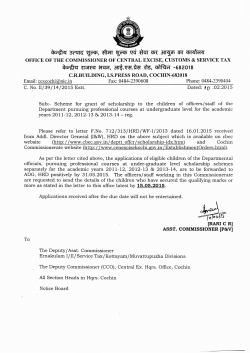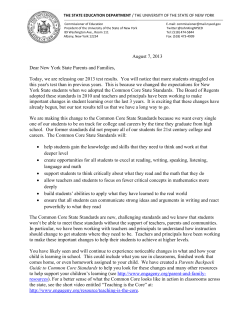
A guide to the Human Rights Commissioner`s Power to Intervene in
The intervention power under the Human Rights Act 2004 When will the ACT Human Rights Commissioner intervene? The Commission acknowledges the work of the Victorian Equal Opportunity & Human Rights Commission, the Australian Human Rights and Equal Opportunity Commission and the New Zealand Human Rights Commission, in drafting guidelines on which the present document is based. 1 A. Background The role of the Human Rights Commission The Human Rights Commission promotes the human rights and welfare of people living in the ACT and provides an independent, fair and accessible onestop shop for complaints of unlawful discrimination, and complaints regarding health services, services for older people, disability services and services for children and young people. The Commission is working to promote improvements in service provision for our community, to promote awareness of the rights and responsibilities of users and providers of services, and to promote understanding of and compliance with the Discrimination Act 1991, the Human Rights Act 2004 and the Health Records (Privacy and Access) Act 1997. The three Commissioners are Dr Helen Watchirs (the Human Rights and Discrimination Commissioner), Ms Mary Durkin (the Health Services Commissioner and Disability and Community Services Commissioner) and Mr Alasdair Roy (Children and Young People Commissioner). The functions of the Human Rights Commissioner with respect to human rights are to: • Review the effect of ACT laws on human rights, and to report to the Attorney General, which report is then tabled in the Legislative Assembly; • Provide human rights education; and • Advise the Attorney General on anything relevant to the operation of the Act. Use of the Human Rights Act in courts & tribunals The Human Rights Act 2004 requires courts, tribunals and decision makers to interpret ACT legislation in a way that is compatible with human rights, as far as it is possible to do so, consistently with the purpose of the legislation. The Act also imposes direct human rights obligations on public authorities (eg public servants or the Australian Federal Police when exercising powers under ACT legislation). It is unlawful for a public authority to act in a way that is incompatible with a human right; or to fail to give proper consideration to a 2 relevant human right when making a decision. Action for a breach of human rights by a public authority may be brought in the Supreme Court, and these obligations may be raised in other proceedings, for example in proceedings relating to public housing or care and protection of children. The Act also enables the ACT Supreme Court to issue a ‘declaration of incompatibility’ where it finds that an ACT law is incompatible with human rights. This does not make the law automatically invalid - it is then up to the Legislative Assembly to decide whether to change the law. The Human Rights Commissioner’s right to intervene The Human Rights Act provides the Human Rights Commissioner with the right to intervene in civil or criminal legal proceedings initiated by other parties, with the permission of the court or tribunal. The Attorney General also has the power to intervene in proceedings involving the application of the Human Rights Act, but does not require the court’s permission to do so. Section 36 of the Human Rights Act provides as follows: (1) The human rights commissioner may intervene in a proceeding before a court that involves the application of this Act with the leave of the court. (2) The court may give leave subject to conditions. The Explanatory Memorandum to the Act makes it clear that the purpose of this power is to ensure that there is independent advocacy in relation to the interpretation and application of the Human Rights Act. The Commissioner cannot initiate proceedings herself nor can she represent an individual or organisation in proceedings. The Human Rights Act broadly defines the word ‘court’ referred to in section 36. This means that in addition to the ACT Supreme Court, ACT Magistrates Court and ACT Children’s Court, the Human Rights Commissioner can seek leave to intervene in proceedings before ACT tribunals including the Administrative Appeals Tribunal, the Discrimination Tribunal, the Guardianship Tribunal and the Mental Health Tribunal. The Human Rights Act does not include a provision for costs orders against the Commission where it seeks leave to intervene under section 36. The Act appears to envisage that the Commission not be exposed to costs when performing its statutory responsibility to assist the Courts in interpreting the 3 rights protected in the Act. Ultimately, of course, this remains a matter for determination by the courts. B. Intervention guidelines 1. The Commissioner will only consider seeking leave to intervene in proceedings where: a. The human rights issues are significant and not peripheral to the proceedings; and/or b. The decision that could be made in the proceedings may significantly affect the human rights of persons who are not parties to the proceedings; and/or c. The proceedings may have significant implications for the ongoing interpretation or operation of the statutory provision being interpreted in light of the Human Rights Act 2004 and/or the Human Rights Act itself. 2. Factors that the Commission considers relevant to its consideration of whether a matter falls within paragraph 1 of these guidelines are: d. Whether the Commissioner proposes to present arguments or facts that other parties will not be canvassing; e. Whether the Commissioner’s involvement would contribute to the decision maker reaching an informed decision; f. Whether the case involves a new or unsettled area of the law; g. Whether the case would clarify a disputed interpretation of the law; h. Whether the case has significant ramifications beyond the parties to the proceedings; i. Whether any parties to the proceedings are self-represented; j. Whether any parties to the proceedings are seeking that a Declaration of Incompatibility be made by the Supreme Court; k. Whether any party has requested the Commissioner to intervene and whether any party would or does oppose intervention; 4 l. Whether the Court or Tribunal has requested that the Commissioner intervene; m. Whether an order has been made pursuant to section 34 of the Human Rights Act; n. Whether any other person or organisation is seeking leave to intervene; o. Whether the Attorney General proposes to exercise his or her statutory right to intervene and the position that the Attorney General intends to take; p. The likely impact of the Commission’s intervention on the individuals involved in the litigation; q. Whether the issue is an intermediate one or will result in a final determination; r. The resource or other administrative implications of the Commission joining the litigation in the context of all its other functions; s. Any broader strategic issues relating to the role, function or reputation of the Commission. As not all of these factors will be relevant to every potential intervention, the Commissioner may give more or less weight to each of these factors depending on the particular circumstances of each proceeding. 3. Whilst the Commissioner’s intervention may in fact benefit specific individuals or groups, the Commissioner’s role is to advocate for the Human Rights Act and its underlying principles. 4. The Commissioner’s interventions will generally focus on questions of law, policy and issues of broader public interest rather than detailed arguments about the facts of a particular case, except to the extent that those facts are relevant to systemic issues or a broader class of persons than is otherwise represented. 5 C. Intervention requests and notifications The Commissioner is only able to consider intervening in proceedings if the Commission is aware that the proceeding is occurring and that human rights issues are likely to be or have been raised. Section 34 of the Human Rights Act requires the Commission and the Attorney General to be notified if a question arises in a Supreme Court proceeding that involves the application of the Human Rights Act, or the Supreme Court is considering making a declaration of incompatibility in a proceeding and the Territory is not already a party to the proceeding. There is no requirement that the Commission be notified about proceedings in other courts or tribunals where human rights issues have been or are to be raised. This means that in all proceedings other than those occurring in the Supreme Court, the Commission relies on informal notifications or requests about the proceedings before considering whether or not to intervene. Information to provide to the Human Rights Commissioner If a party to a proceeding or other individual or organisation wishes to notify the Commission pursuant to section 34 of the Human Rights Act or request that the Commissioner intervene in proceedings in courts or tribunals other than the Supreme Court, then it is important that accurate information about the proceedings and the human rights issues it raises be provided to the Commission. This will assist and inform the Commissioner’s consideration of whether or not an application for leave to intervene in the proceeding will be made. The following is a list of information about the proceeding that should, if practicable, be provided to the Commission by the party notifying or seeking the intervention of the Commissioner: 1. The name or title of the proceeding and the relevant court or tribunal number: e.g. R v Smith SCC 90 of 2008; 2. The name of the court or tribunal in which the proceeding is being heard; 6 3. The names of all parties to the proceedings and their legal representatives/counsel; 4. The date and time of the next court or tribunal appearance and the proposed purpose of that appearance e.g. trial, directions hearing; 5. Whether any party to the proceeding is in custody and, if so, the basis for their detention e.g. sentenced prisoner; 6. If applicable, a copy or summary of the section 34 directions made by the judicial officer; 7. Details of any other relevant directions already made in the proceedings particularly if the directions relate to important deadlines e.g. timetable for written submissions, trial dates etc; 8. An outline of the nature and history of the proceeding including (if applicable) copies of any key court documents e.g. application and supporting affidavit, indictment and case statement, written submissions etc; 9. An outline of the human rights issues that are to be or have been raised including (if applicable) copies of any written submissions or court documents that have been filed since the commencement of the proceedings which relate to the Human Rights Act or human rights issues; and, 10. Any other information that may be relevant to the Commissioner’s consideration of the intervention guidelines. This information should be sent with a cover letter to the following address: Human Rights Commissioner ACT Human Rights Commission GPO Box 158 CANBERRA CITY ACT 2601 D. Assistance and Review We will review the intervention guidelines regularly. If you require general information about the intervention process or wish to provide feedback on the 7 intervention guidelines, please contact the Human Rights Commission on 02 6205 2222 or by email to human.rights@act.gov.au 8
© Copyright 2025









